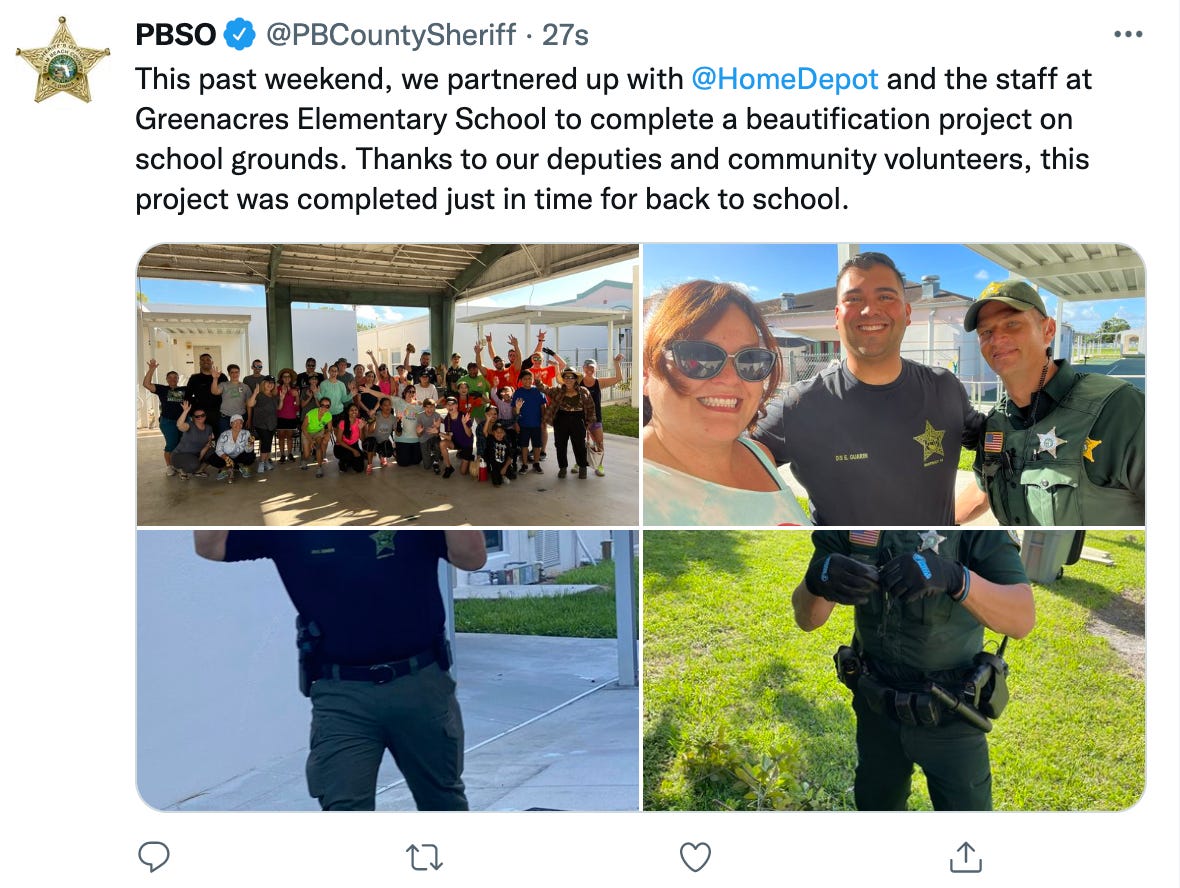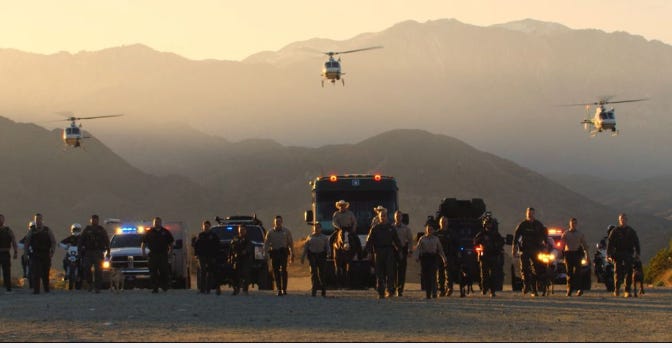August 2 was National Night Out, which touts itself as “an annual community-building campaign that promotes police-community partnerships and neighborhood camaraderie to make our neighborhoods safer, more caring places to live.” It’s a nonprofit network whose purpose is to create copaganda that looks grassroots, as if all of a sudden, a bunch of cops spontaneously decided to throw balls or whatever.
NNO emerged from a network of community watch groups, which was in turn created by a very avid “volunteer” cop in Pennsylvania named Matt Peskin. Peskin described the origin of NNO in a slightly less palatable manner:
You know, 99-percent of us are law-abiding, so when you have the majority comes out in force like that, it shows criminals that, you know, people are fed up and that they are going to look for suspicious activity, they are going to call police and it really helps to demonstrate that strong police/community partnership that is out there.
National Night Out also comes at a time when law enforcement agencies around the country are whining about having a tough time hiring. The media has largely cooperated by amplifying this narrative and attributing some of the hiring lag to “police reforms” and the “defund the police” slogan.
While there have been some resignations in the past few years, it’s not clear why people are not applying to work in law enforcement. Departments complain regularly that they have unfilled positions, largely as a way to excuse a lack of policing, failure to solve crimes, and deaths in custody.
But, don’t worry, President Joe Biden says, he is here to help. This week, he announced his “Safer America Plan” (delayed a few days by a positive COVID test) that promises over $37 billion for pro-police goodies, like trainings, body cameras (which is only $1 billion of the total), retention bonuses, dealing with so-called “organized retail theft,” technological surveillance, and more. Some of the money is designated for crisis intervention programs ($700 million) and community violence prevention ($5 billion), which could possibly not go to cops, but probably will. This is on top of the American Rescue Plan funding, which is being used across the country to fund mass incarceration.
Specifically, a third of the funding, or $12.817 billion, is earmarked to hire 100,000 officers through the COPS Hiring Program, which provides grants to local law enforcement agencies to hire more sworn personnel.
This is hardly unexpected. During his March 2022 State of the Union address, Biden announced, “We should all agree the answer is not to defund the police. It’s to FUND the police.” (Caps in original.)
The rhetoric is a big middle finger to anti-carceral groups who have been fighting to reduce jail and prison populations in light of a pandemic that spreads in close quarters, trying to stem the tide of police shootings and other violence, and attempting to understand why the police solve so few crimes with so many resources.
This is also par for the course for Biden, who was the architect of the infamous 1994 Crime Bill, which ushered in the war on drugs and massively increased mass incarceration.
The 1994 Crime Bill created the COPS program with the initial goal of hiring 100,000 officers. Clinton fell short of that goal, hiring somewhere between 50,000 to 80,000, according to the most generous estimates. At this point, the common consensus among experts is that the 1994 bill was a flop. It did not improve communities and it did not decrease violence. It DID (recall FUND) escalate the “drug war” and DID encourage states to put more people to death, whether through execution or life in prison. And those 80,000-ish (being generous) cops? Many were in rural areas where COPS was basically a jobs program – no notable impact on “community policing” there. (Slate pointed out in 2001, “Since 1994, COPS has doled out cash to more than 12,000 different law enforcement agencies.”)
Much also went to technology, which theoretically freed LEO to be “on the street” – except there’s no evidence to show they were – in fact, repeated analyses done in the early 2000s showed that there was no net increase in the number of beat cops, and, in some areas like Atlanta and Chicago (where the crime rate was higher than other grant-winning cities) the number of cops WENT DOWN. Even if some places got a new beat cop, repeated studies have shown that more officers do not decrease crime.
Do police deserve more money? Well, despite their alleged lack of personnel, they seem to have plenty of time to install air conditioners in private citizens’ homes as people cook in their jails or to hold weekly Facebook Live sessions (even though they claim to be too busy to respond to subpoenas) or to hire public relations experts in order to spin their social media. Is the real problem not enough personnel?
The COPS program also doesn’t do any vetting in terms of how agencies use their money or in whether such spending results in positive outcomes. Consider the Riverside County Sheriff’s Office, which received $1 million last year from COPS to hire more deputies. The sheriff there, Chad Bianco, is an admitted member of the Oath Keepers who has repeatedly stated his intention to defy state laws with respect to health, women’s reproductive care, and gun licensing. (Bianco is also alleged to have misspent $4.6 million of American Rescue Act funds. One wonders if any new hires from this COPS program will solve that crime.)
Biden and the Democrats have a number of (IMHO) unpersuasive reasons they’ve decided to pump up police budgets before midterms elections. They might be worried about the recent recall of a reform-minded prosecutor in California or the much-reported “rise in crime.” Underlying these concerns are the facts that the Biden administration hasn’t done enough to protect people from COVID and probably will not succeed in doing anything to stem monkeypox. Incarcerated people suffer the most from such pandemics and are the least to receive assistance. Biden has once again chosen his side, and it’s a shame it’s the same one he picked 30 years ago.
But his choice has bigger implications for policing in this country. The January 6 hearings have reminded Americans once again that law enforcement is a major recruitment pool for far-right extremist groups, now surpassing the military. (On far-right message boards, ex-military personnel accuse the armed forces of being “too woke.”) They are willing to use force on those of us who stand in their way. They will recruit militias and posses who will enact vigilante justice under the cover of “law.” It is our law enforcement sub-state that, unconstrained by the Posse Comitatus Act, is becoming our occupier. And the federal government has opted, time and time again, to keep funding their bottomless maw. Truly, law enforcement agencies believe they are entitled to our money, our attention, and our respect, without giving anything in return. The wages of even the most indirect criticism is death.
America has chosen to create its own storm troopers, a militia that numbers around 770,000 sworn officers. How can we be shocked when their closest ideological allies and patrons, Republicans, use them to suppress the vote, even as Democrats spoil them with almost equal dollars? How can we be shocked when, finally, they simply turn on the rest of us?








